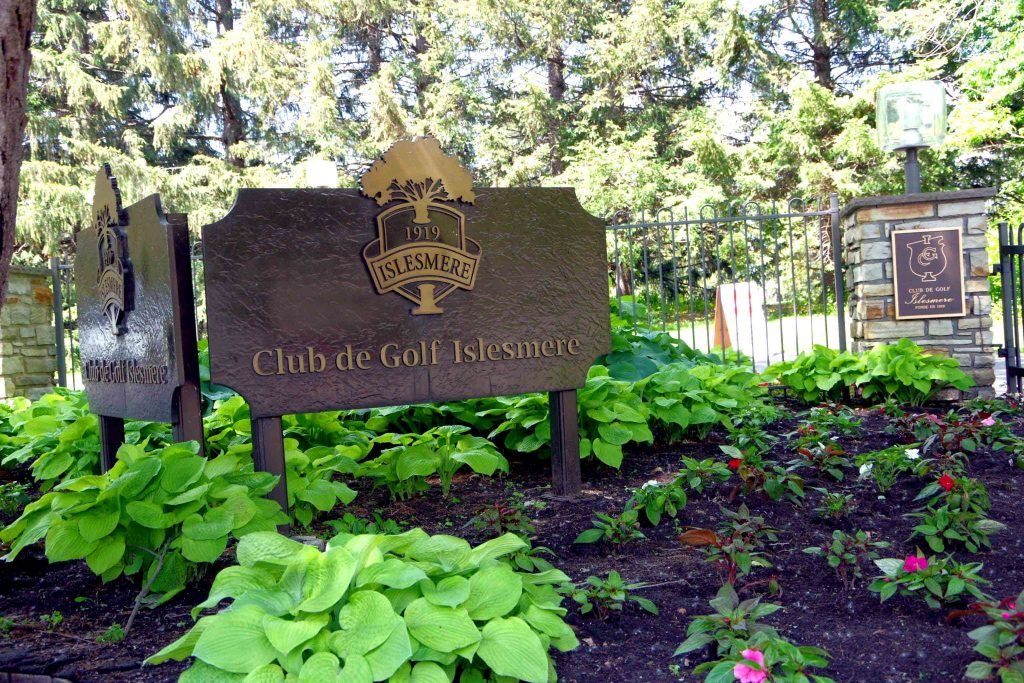Council served with notice of Laval region’s vanishing golf courses
Nearly a dozen residents of Webb Ave. and other streets in western Chomedey questioned Mayor Marc Demers during Laval city council’s June 2 webcast meeting on the major infrastructure work being conducted outside their homes, as protesters for the cause tried as best they could to stir up attention on the plaza outside Laval city hall.
The questions, which were submitted by e-mail and read out by a staff member, raised doubts about the wisdom of narrowing the width of the streets, widening the sidewalks and adding greened over border areas containing shrubs and plants.
Impact on seniors
“There are many owners here who are older people,” said Angie Patsios, a Webb Ave. resident, maintaining that some of the changes will cause hardship for senior citizens by complicating snow removal during the winter. She also claimed that most residents of the area don’t want the green border areas installed.
“Does the city not have a moral obligation to consult the owners affected by these changes when the vast majority are strongly opposed and have made complaints?” she added.
Weeds, leaves, etc.
Another resident wrote, “Why hasn’t anyone replied to our request to the director-general, to the mayor’s office? Why does the City of Laval want to have strip grass and trees on the west side of Webb Avenue? No one wants to have the problem of weeds, leaves, debris etcetera on their own lawn coming from the addition and the extra maintenance.”

Other residents also suggested there could be complications created by the new infrastructure for the pick-up of waste and recycling bins by city workers, as they maintained that the city never bothered to formally consult them on the changes.
‘We consulted,’ says Demers
Mayor Marc Demers defended the city’s position. “When it is said that the citizens were not consulted, on the contrary we created a vision for across the City of Laval and we consulted across the city,” he maintained. “Some might say, ‘Yes, but the citizens across the City of Laval aren’t necessarily concerned with what is going on our street.’”
He said “the reason the work is taking place on your street is mainly due to a problem involving sewers that are at the end of their usefulness. So, if we don’t do it within a reasonable timeframe, we risk having major problems and you also risk having major problems.”
Regarding the widening of the sidewalks, he read out a letter received at city hall from a man who is confined to a wheelchair.
Wheelchair mobility
The letter writer recounted that while backing his wheelchair on du Couvent St. in Chomedey, he accidentally slipped off the sidewalk because it was narrow and couldn’t get back up. Demers cited the incident as something the city hoped to avoid in the future by building wider sidewalks that are friendlier to persons with reduced mobility.
As for consulting residents, Demers acknowledged the city didn’t consult people on every street, but noted that “all the people paying for the repairs that will be made on your street, which will cost quite a few million dollars, should be consulted too. So, that’s why we consulted the people around the city to see what our policy should be.”
While saying that most other residents in Laval had no objections to similar changes being made on their streets, Demers added, “We will see if there is something particular on your street for you and we will answer all your questions.”
Future of golf courses
Also during question period, Jonathan Tremblay said the Laval-based organization Parc Sentiers des Bois had become concerned lately about the future of the golf courses that are still operating in Laval.
There are currently at least five golf courses on the island: The Islemere Golf Club in Sainte-Dorothée, the Club de Club Laval-sur-le-Lac in Laval-sur-le-Lac, the Club de Golf Le Cardinal and Golf UFO in Laval-Ouest, and Club de Golf Saint-François in Saint-François. (Le Cardinal recently closed part of its course and sold it for housing development.)
“In the event of the sale or end of their commercial activity, it would be important that golf courses not be re-dedicated entirely to real estate development,” Tremblay said in an e-mailed question. He asked whether the City of Laval would be willing to develop a strategy for the future of the golf courses while doing so before changing the zoning for golf courses.
Demers pledges to consult
Responding to Tremblay, Mayor Demers maintained that the zoning status of the golf courses will never change without residents being consulted first. “Not a single golf course will change zoning without the population having their say,” he said, while also giving his assurances that part of the golf courses will always be reserved for future green spaces.
Action Laval opposition councillor David De Cotis noted that he would be tabling a resolution later in the council meeting that called upon the city to explore the feasibility of forming a common front with Terrebonne, Mascouche, Candiac and Beloeil to ask Quebec to change municipal law so it becomes easier for towns and cities to expropriate old golf courses and turn them into green spaces and parks.



